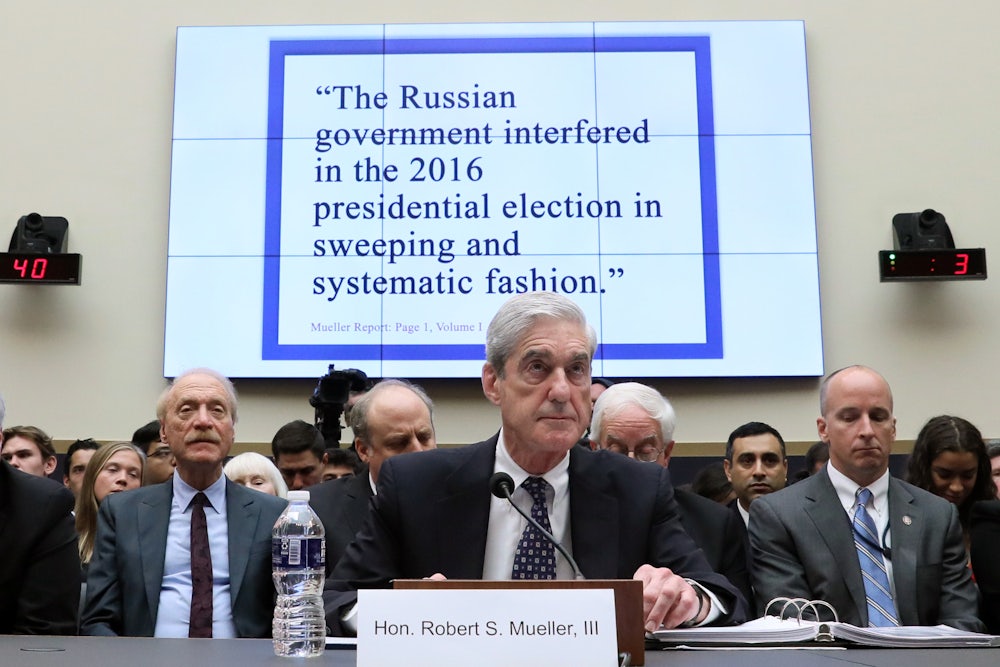It would be understandable if you missed it because it came close to the end of seven hours of repetitive, somewhat inscrutable testimony, but Special Counsel Robert Mueller did make news Wednesday. Representative Raja Krishnamoorthi, a member of the House Permanent Select Committee on Intelligence, got Mueller to admit that the FBI currently has an ongoing investigation involving false statements by Michael Flynn, President Trump’s short-lived national security advisor.
“Since it was outside the purview of your investigation, your report did not address how Flynn’s false statements could pose a national security risk because the Russians knew of the falsity of those statements, right?” Krishnamoorthi asked.
“I cannot get into that mainly because there are many elements of the FBI looking at that issue,” Mueller replied.
“Currently?”
“Currently,” Mueller confirmed.
While his House colleagues spent the day trying to get Mueller to say that the president should be impeached—or, alternatively, from the GOP’s perspective, that investigation was corrupted from the outset—it was left to Krishnamoorthi, a lawyer who represents a district in the suburbs of Chicago, to pick up the thread of Mueller’s largely-forgotten counterintelligence investigation. Mueller was tasked with conducting that investigation when he was appointed as special counsel in May 2017.
As Mueller’s report later revealed, it was then–FBI director James Comey’s testimony about the counterintelligence investigation to the House Intelligence Committee that so infuriated the president and set in motion the events that led to Comey’s firing and then, Mueller’s appointment. Under the special counsel, the counterintelligence investigation quickly shifted gears to a criminal investigation, but the original probe that Mueller inherited never went away. While the public’s attention was focused on the multiple convictions, guilty pleas, and charges against 34 individuals and three companies, the counterintelligence investigation continued quietly running below the surface. And, as Mueller’s Wednesday testimony suggests, it still continues.
The fruits of this inquiry may never be seen in public because its primary mission isn’t to investigate and prosecute crimes. The job of FBI counterintelligence was and is to neutralize the threat posed by foreign intelligence—which, in this case, means dealing with what the special counsel’s report called Russia’s “sweeping and systematic” effort to interfere in the 2016 presidential election. But the investigation’s low visibility shouldn’t diminish its importance, which is no less than a probe into whether the president himself was acting on behalf of Russia’s interests.
The FBI, as the lead agency for exposing, preventing, and investigating intelligence activities on U.S. soil, sent officials with the bureau’s Counterintelligence Division to meet regularly with members of the special counsel’s team. For more than a year, FBI agents were embedded in Mueller’s office. Their purpose, according to a little-noticed section of the special counsel’s report, was “to review the results of the investigation and to send—in writing—summaries of foreign intelligence and counterintelligence information to FBIHQ and FBI Field Offices.” But not all of the information in those summaries appeared in Mueller’s final report.
Sometimes a counterintelligence investigation can lead to criminal charges. Michael Flynn’s lies about his communications with the Russian ambassador were indeed criminal—he pleaded guilty to charges of lying to the FBI—but, as the Wednesday hearing underscored, they also posed a counterintelligence threat. The Russians obviously knew that Flynn had lied, and that left the president’s top national security aide exposed to blackmail by a hostile foreign power. This deeply worried Justice Department officials in the early days of the Trump administration, but the president was less concerned. Even though the White House was informed of Flynn’s potential problem by acting Attorney General Sally Yates just days after the inauguration, it took another 18 days for Trump to fire his national security advisor.
In response to another question by Krishnamoorthi, Mueller said that the goal of the counterintelligence investigation was “secondary” to his criminal investigation. In other words, Mueller saw his main job as investigating President Trump and his campaign—and prosecuting some of its members. The criminal probe is the focus of his 448-page report—counterintelligence is hardly mentioned.
This is the missing volume in the special counsel’s report. While Mueller may not have found enough evidence to support criminal charges over the Trump campaign’s ties to the Russian government, there is little doubt that the president’s behavior toward Russia and its leader, Vladimir Putin, poses a threat to national security. A criminal president is obviously a threat to the nation, but so is a president who can’t or won’t respond to the ongoing threat of foreign interference.
Mueller said Wednesday that Russia’s efforts to interfere in U.S. elections were occurring “as we sit here,” and he almost seemed to regret that the danger posed by Russia wasn’t more strongly emphasized in his report. “Over the course of my career, I’ve seen a number of challenges to our democracy,” Mueller said. “The Russian government’s effort to interfere in our election is among the most serious.”
Mueller warned that during the coming presidential election, the U.S. would face an even bigger threat than the one he investigated. “Many more countries are developing the capability to replicate what the Russians have done,” he said.
“This deserves the attention of every American,” said Mueller, reiterating a plea from his brief May 29 press conference.
But attention will not likely come from Trump. During last month’s G20 summit in Osaka, Japan, the president treated the threat to the 2020 election as an opportunity to further bond with his Russian counterpart. Responding to a reporter’s question, Trump playfully pointed his finger at Putin and said, “Don’t meddle in the election.” Putin just laughed.
The president might think that the ongoing Russian effort to interfere in American democracy is still a big joke. Here’s hoping the FBI’s Counterintelligence Division still doesn’t.
